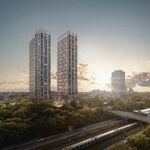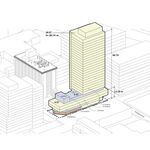Queen's Park mulls reforms to powerful land-use tribunal
The provincial Liberal government is contemplating an overhaul of the Ontario Municipal Board that would dramatically reduce the powers of the controversial land-use tribunal.
The Globe and Mail has learned that the current proposals under active discussion inside Queen’s Park would significantly rein in the powerful OMB, which has long been criticized by municipal planners, politicians and local residents as too friendly to developers.
But some fear a drastically weakened OMB would give too much power to local politicians beholden to not-in-my-backyard (NIMBY) neighbourhood associations, potentially slowing development, blocking attempts at intensification and making it harder to build more new housing in the Toronto-area’s already hot real estate market, which the province is scrambling to find ways to cool.
Critics have been pressing the province for years to either scrap or radically restructure the OMB, which hears applications from developers trying to build projects over the objections of local city planners or residents.
With Premier Kathleen Wynne’s government sinking low in opinion polls and an election due next year, that pressure intensified in recent weeks after a controversy erupted over a 35-storey condo tower approved next to John Fisher Junior Public School near Yonge Street and Eglinton Avenue in Ms. Wynne’s midtown Toronto riding. The project has prompted vocal protests from parents, the school board and Toronto Mayor John Tory, who called the project “preposterous.”
Sources familiar with the proposals say the reforms would see the OMB turned into a more hands-off appeal body, along the exact lines that many of its critics, including Toronto chief planner Jennifer Keesmaat, have called for.
Under the current plans, The Globe has learned, the OMB would be largely stripped of its ability to conduct what are known as de novo hearings, or hearings that start from scratch. Such hearings would only occur if a municipality fails to make a decision on a development within the required time frame. As a result, the reformed OMB would largely be restricted to considering challenges of council decisions, as an appeal court might.
In another proposal, most of the new OMB’s hearings would be through written submissions, eliminating the costly and time-consuming courtroom-like process required now that can see city planners cross-examined as though they are witnesses at a trial.
For major decisions, one source familiar with the proposals said, the OMB would be required to have a panel of three members, instead of leaving the entire ruling up to just one member as it does now.
The OMB would also, in the first instance, likely send its ruling back to the municipal council in question for reconsideration. Whatever the council then decided could bounce back up to the OMB for another appeal, however.
The proposed reforms would also drastically scale back the OMB’s current wide-ranging powers over outcomes, strictly limiting its decisions to whether a council has complied with the province’s planning policy statements and the council’s own municipal official plan. This could mean that developers’ efforts to go beyond limits imposed by a council, such as on the height of a condo tower, for example, at the OMB would be dramatically reduced.
Sources say the OMB would no longer hear challenges, usually launched by developers, to entire municipal official plans, a practice that can now delay their implementation for years.
Last year, the Premier told Municipal Affairs Minister Bill Mauro to make reviewing the OMB a key mission of his mandate. In October of 2016, his office released a public consultation paper that laid out many of the possible changes, and sought feedback from planners, developers and the public. One source said recently that the proposals now on the table at Queen’s Park still needed to be approved by a cabinet committee. The government has long said that proposed amendments to the Planning Act to reform the OMB would be put forward for legislative approval this spring.
Mark Cripps, press secretary for Municipal Affairs Minister Bill Mauro, called The Globe’s report “speculation” and said the minister had made no final decision on any OMB reforms. The legislation still had to be drafted, he said, although he expected it to be unveiled before spring was out.
“Nothing’s been finalized yet. A lot of this sounds like right out of the consultation paper,” he said. “We expect to bring something forward in the coming months.”
With many developers blaming the current amount of red tape for slowing project approvals and exacerbating the real estate crisis, some are concerned a weakened OMB would only make things worse. They can be expected to fight back against the proposals. Just last week, a group of senior developers met with the Premier and pleaded their case.
“The reality is that those local political decisions will not all be good planning decisions,” said Joe Vaccaro, chief executive officer of the Ontario Home Builders’ Association. “What other mechanisms are you going to put in place to ensure council decisions are good planning decisions?”
Ms. Keesmaat, Toronto’s chief planner who has been advocating for changes to the OMB, along with her counterparts in municipalities across Ontario, said the proposals contain many of the reforms she has been calling for. “I am very optimistic that we are on the cusp of reforms that will repair what is right now a really broken system,” Ms. Keesmaat said.
She dismissed concerns that a weaker OMB and a strengthened hand for city council would allow NIMBYs to strangle new development in Toronto. “There already is a very pro-development culture in the city,” she said. “We wouldn’t be one of the fastest growing cities in North America if that wasn’t the case.”
Geoff Kettel, co-chairman of the Federation of North Toronto Residents’ Associations (FONTRA) and a veteran of battles at the OMB in which residents and city planners must face off with well-funded developers’ legal teams, welcomed the proposed reforms. He said they would make it much less likely that an “egregious” condo tower would be approved next to a school such as John Fisher.
In that case, the city and local residents ended up dropping their opposition to the high-rise tower on a midrise site in a mediated settlement because it seemed clear they would lose in a full hearing before the OMB.
“The big issues for us were the influence of money … and the need to level the playing field,” Mr. Kettel said. “There is that elephant in the room all the time. With having the OMB so powerful, even if the city would [like to] turn something down, they might not … because they know they are going to have to go to the OMB.”
In an e-mail, prominent Toronto developer Stephen Diamond defended the current OMB model: “The OMB has been part of the planning of our city for over 70 years and has helped shape Toronto to be one of the most liveable and dynamic cities in the world.”
He warned that any changes must “ensure that responsible land use decisions continue to be made to safeguard an adequate supply of land for housing.”




